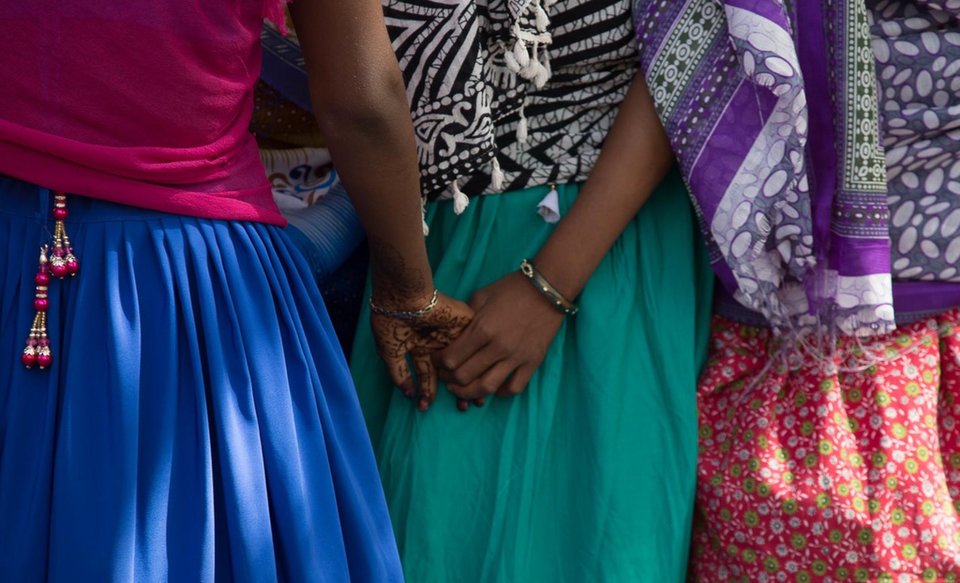We are committed to reducing carbon emissions and safeguarding equality, both within our organisation and via our partners.
In 2020, we developed our carbon footprint assessment and climate mitigation policies and will be supporting our partners to do the same from 2021. We also published our commitment to gender, equity and inclusion, which applies to our own organisation as well as to partner initiatives.
Reducing our emissions in line with a 1.5°C future
Our commitment to carbon neutrality led us to commission our first carbon footprint assessment which is based on Greenhouse Gas (GHG) Protocol, including using new methodologies to assess the impact of working from home. This was done in a consultative way, as we formed a working group to investigate practicable ways to reduce our carbon footprint, leading to new policies and working practices.
As a global organisation with a high-touchpoint approach, business travel, along with commuting, would usually represent the main source of our total emissions. However, the global pandemic-related travel restrictions that began in March 2020, which prevented us from going to the office, visiting our partners and having face-to-face meetings, meant the miles we travelled, and the associated carbon emissions are not typical.
Carbon Emission AnalysIs
Greenhouse Gas emissions
by scope and office
Scope 1
Direct emissions from owned or controlled sources, including fuel to heat and cool our offices.
Scope 2
Indirect emissions from the generation of purchased energy for use in our offices.
Scope 3
Indirect emissions (not included in scope 2) that occur in our value chain including business travel, employee commuting, home office energy use, and our partners’ emissions, which we’ll start to measure in 2021.
EmissionS per country*
*Tons of CO2 eq
Moving forward, mitigating the environmental impact of our business travel and commuting emissions will be a key area of focus for us as we work to reduce our climate footprint.
Reducing the emissions of our partners - our own equivalent of a supply chain - is also a challenge, and enabling them to assess their own carbon footprints and develop carbon mitigation strategies is a priority for us in 2021.
Climate-focussed processes implemented
We have designed new policies that ensure our carbon footprint remains low. These include a travel policy proposing using only low-carbon transport modes and providers, where necessary; a flexible working policy which will reduce staff commuting once the pandemic has ended; and a procurement policy requiring more robust sustainability credentials from future suppliers.
While we work towards carbon neutrality, we’ll continue to offset our emissions. In 2020, we offset 222 Verified Carbon Units (VCUs), through Carbonext SA, a carbon-offsetting reforestation project in the Amazon.
We will allocate funds and resources to support partners to assess their own carbon footprint and co-create climate mitigation strategies to reduce their emissions.

Fostering
diversity
and inclusion
We apply a comprehensive gender, equity and inclusion (GEI) lens to all our work, focussing not just on our initiatives with partners and their organisations, but our own teams as well.
We apply a comprehensive gender, equity and inclusion (GEI) lens to all our work, focussing not just on our initiatives with partners and their organisations, but our own teams as well.
Our framework encompasses an ‘above the line’ approach to ensure respect and inclusion for all those affected by our work and a ‘below the line’ approach to ensure robust accountability and prevent unintended harm.
In 2020, we conducted an analysis of gender, equity and inclusion throughout our current programmes. Building on our foundational definition of inequality that encompasses social and gender equity, we introduced new inequality focussed rubrics to evaluate specific outcomes for all partners. We’ve also embraced a new Effective Philanthropy strategy that ensures all future programming will use a robust gender and social inclusion lens and rolled out new anti-discrimination and harassment and safeguarding policies to ensure accountability and prevent harm to those who interact with our partners.
In addition, we target gender equity through our partnerships, with a particular focus on organisations leading economic justice work and addressing gender-based violence. In Asia these include International Women's Rights Action Watch Asia-Pacific, Breakthrough and Solidarity Center. In Latin America we work with the International Trade Union Confederation and Patricia Galvao Institute, and globally with the Centre for Women's Global Leadership to elevate attention to workplace gender-based violence and ILO Convention 190 on violence and harassment at work, an important new international instrument to combat this issue.
We are investing in an increasingly diverse workforce with a global outlook and driving accountability across the organisation for diversity and inclusion is a key priority.
We foster a culture of inclusion. Over 40% of employees were members of at least one ‘community of practice’ in 2020, and all staff have completed our anti-discrimination and harassment policy training.
We have established a diversity practice within our recruiting team that focusses on broadening the candidate pipeline and provides training for hiring managers. We strive to eliminate bias from the process and improve the recruitment, advancement and retention of underrepresented talent.
Global gender ratio
PERCENTAGE OF Employees per country (%)
Redefining value for the good of all.
Laudes Foundation was launched in January 2020 to address the dual crises of climate breakdown and deepening inequality by supportive brave, innovative efforts that inspire and challenge industry and finance to harness their power for good. Laudes Foundation is building on the lessons learned from C&A Foundation, and is committed to advance its work to accelerate the transition to a climate positive and inclusive economy.
Follow Laudes Foundation